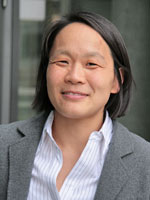Internationally Recognized Biologist, Elly Tanaka, to Discuss Limb & Spinal Cord Regeneration at MBL Friday Evening Lecture, July 6

FOR IMMEDIATE RELEASE: July 3, 2012 Contact: Gina Hebert, Senior Publicist/Development Communications, Marine Biological Laboratory Phone: (508) 289-7725| E-Mail: ghebert@mbl.edu
MBL, Woods Hole, MA – The ability of salamanders to regenerate a complete limb or tail after cutting anywhere along their length has fascinated biologists for centuries. Yet the complex make-up of the mature tissue and the wound response as the starting point, have posed daunting challenges to understanding the cell and molecular biology of these phenomena.
Dr. Elly M. Tanaka of the Center for Regenerative Therapies, Technical University of Dresden, Germany, will discuss her regeneration biology research using the salamander at the next MBL (Marine Biological Laboratory) Friday Evening Lecture on Friday, July 6. The lecture, "Deconstructing the Complexity of Vertebrate Limb and Spinal Cord Regeneration," will be held at 8:00 PM in the MBL's Lillie Auditorium, 7 MBL Street, Woods Hole. The event is free and open to the public.
Dr. Tanaka is internationally recognized for her work rejuvenating the study of regeneration biology. By developing molecular genetics and imaging techniques in the salamander, she has defined the stem cells that undertake limb regeneration and their potency. She has also performed studies of the neural stem cells responsible for spinal cord regeneration and has identified the molecular pathways triggered by injury that induce their self-renewal and their regenerative phenotype. More recently she has begun applying this knowledge toward directing the morphogenesis and differentiation of mouse and human neural stem cells.
Dr. Tanaka received an A.B. from Harvard University and a Ph.D. from the University of California at San Francisco. As a post-doctoral fellow at the University College, London, she started her studies on salamander limb regeneration. Later, at the Max Planck Institute of Molecular Cell Biology and Genetics, Dresden, Germany, she initiated live imaging and molecular genetics approaches to studying spinal cord and limb regeneration. Dr. Tanaka’s honors include the Biofutures Award from the German Federal Ministry of Biotechnology and Research (2003), as well as a European Research Council Advanced Investigator Award (2011).
The Friday Evening Lecture Series will continue throughout the summer at the MBL. The remaining lectures in the series are below. For more information, visit mbl.edu/FEL
July 13, 2012
"Earth at Seven Billion"
Jesse H. Ausubel, The Rockefeller University
July 20, 2012
Forbes Lecture
"Using Deadly Cone Snails to Understand Nervous Systems"
Baldomero M. Olivera, University of Utah; Howard Hughes Medical Institute
July 27, 2012
"Is Science Revolutionary? Thomas Kuhn and the Structure of Science"
Jed Z. Buchwald, California Institute of Technology and Paul Hoyningen-Huene, University of Hannover, Germany
August 3, 2012
Glassman Lecture
"Protein Folding in the Cell: The final Step of Information Transfer" - Arthur L. Horwich, Yale University, Howard Hughes Medical Institute
August 10, 2012
Joshua Lederberg Lecture
"Food and Sex: The Neurogenetics of Innate Behavior"
Leslie B. Vosshall, The Rockefeller University; Howard Hughes Medical Institute
August 17, 2012
Sager Lecture
"How Bacteria Talk To Each Other"
Bonnie L. Bassler, Princeton University; Howard Hughes Medical Institute
—### —
The Marine Biological Laboratory (MBL) is dedicated to scientific discovery and improving the human condition through research and education in biology, biomedicine, and environmental science. Founded in 1888 in Woods Hole, Massachusetts, the MBL is an independent, nonprofit corporation.
